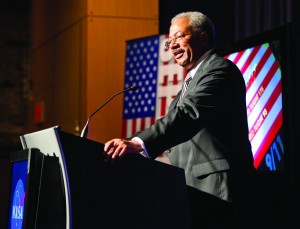
Drexel University was awarded a $3,175,000 grant from the National Science Foundation July 30 to increase the number of ethnic minority students completing degree programs in science, technology, engineering and mathematics.
The funding will support the Greater Philadelphia region Louis Stokes Alliances for Minority Participation, which is headed by Drexel but also includes Cheyney University of Pennsylvania, Community College of Philadelphia, Delaware State University, The Lincoln University, New Jersey Institute of Technology, Temple University, University of Delaware and the University of Pennsylvania.
The Philadelphia LSAMP program was established in 1994. Drexel assumed leadership of the program in 2000, and upon the recommendation of the program’s executive committee, the project management of the program was shifted to Drexel during the same year.
According to their website, LSAMP was founded with the mission “to substantially increase the quantity and quality of African American, Hispanic and Native American students” receiving baccalaureate degrees and graduate degrees in STEM fields.
Thus far, some ethnic minorities have been underrepresented in STEM fields for a variety of reasons. They include lack of access to technology, education and training in STEM subjects; lack of role models; misperceptions about their educational capabilities; challenges in completing math requirements; and lack of financial resources. However, due to the United States’ shift toward knowledge-intensive economic activity and the anticipated retirement of STEM professionals in the government sector in the near future, the mission of providing access to and retaining these minorities in STEM fields is paramount to meet the impending demand for well-trained individuals.
“STEM skills are increasingly necessary in a 21st-century economy that depends heavily on the technology, science and engineering sectors,” Rep. Chaka Fattah, the lead appropriator for the NSF and a strong advocate of STEM, wrote in an email. “These have been fields that are historically underrepresented by disadvantaged minority communities, and by making a concerted effort to attract talented individuals in these sectors through LSAMP and similar initiatives, we can change this course.”
According to U.S. Census Bureau projections, minorities will be about half of the U.S. population by 2050 and a large segment of the labor force.
According to Veniece Keene, project coordinator of the Philadelphia LSAMP at Drexel, the program intends to use the grant to further ramp up its current activities and replicate more of each institution’s successful practices throughout the other institutions in the program. In addition, LSAMP plans to develop more inter-institutional collaborations among its partner institutions and other regional LSAMP programs, further enhance and develop partnerships with national and regional research laboratories, and collaborate with other federally funded programs in partner institutions to increase the capacity to integrate research and education.
Historically, Philadelphia LSAMP has more than doubled its minority STEM bachelor’s degrees annually and has produced over 10,200 minority STEM degrees, over 2,400 minority STEM master’s degrees and over 340 minority STEM doctorate degrees as of August 2013.
Over the next five years, the program aims to increase the minority STEM bachelor’s degree production to, at minimum, over 800 degrees annually, the number of students participating in undergraduate research from 100 to 200 students annually, the number of community college students entering partner institutions from 140 to 225 students annually, the number of students attending national STEM conferences from 100 to 200 students annually, and move at least 40 percent of LSAMP graduates (320 students) into graduate STEM education.
According to Keene, although financial support is essential for the LSAMP program to accomplish its mission, it also needs institutional commitment, administrative support and faculty involvement. The presidents of the participating institutions have given their support for the Philadelphia LSAMP initiative and serve on the program’s governing board, but there is an increasing demand for high-quality STEM faculty to provide research opportunities as well as inspire, recruit, advise and mentor students.
“We must start inspiring students in STEM fields at a young age and increase recruitment and retention,” Fattah wrote in an email. “I’ve lead the charge in Congress to infuse STEM into mentoring programs around the country, so that students not only are exposed to STEM but additionally are provided a strong network to encourage a lasting interest and success in STEM courses. I’ve also introduced legislation, America’s FOCUS Act, which would dramatically increase funding for STEM education throughout the country.”
To date, Philadelphia LSAMP has raised over $27 million in funding in support of underrepresented minority students in the Greater Philadelphia tri-state region. The program provides services to approximately 2,000 students per year and hopes to directly serve 90 percent of targeted minority undergraduate STEM students within the next five years.

